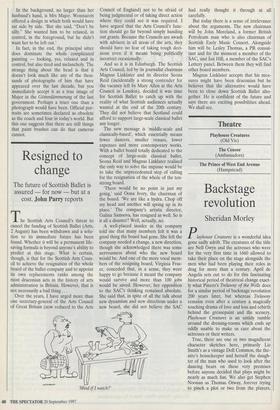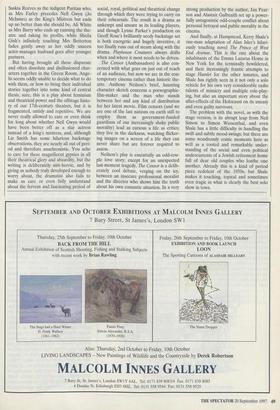Theatre
Playhouse Creatures (Old Vic)
The Censor (Ambassadors) The Prince of West End Avenue (Hampstead)
Backstage revolution
Sheridan Morley
Playhouse Creatures is a wonderful idea gone sadly adrift. The creatures of the title are Nell Gwyn and the actresses who were for the very first time in 1660 allowed to take their place on the stage alongside the men who had been playing their roles in drag for more than a century. April de Angelis sets out to do for this fascinating historical period of theatrical change exact- ly what Pinero's Trelawny of the Wells does for a similar period of backstage revolution 200 years later, but whereas Trelawny remains even after a century a magically touching drama of love and loss and rebirth behind the greasepaint and the scenery, Playhouse Creatures is an untidy ramble around the dressing-rooms which ends up oddly unable to make us care about the actresses or their writers.
True, there are one or two magnificent character sketches here, primarily Liz Smith's as a vintage Doll Common, the the- atre's housekeeper and herself the daugh- ter of the man who used to look after the dancing bears on these very premises before anyone decided that plays might be nearly as much fun. We also get Stephen Noonan as Thomas Otway, forever trying to pinch a plot or two from the players, Saskia Reeves as the indigent Puritan who, as Mrs Farley precedes Nell Gwyn (Jo McInnes) as the King's Mistress but ends up no better than she should be, Ali White as Mrs Barry who ends up running the the- atre and taking its profits, while Sheila Gish's infinitely touching Mrs Betterton fades gently away as her oddly unseen actor-manager husband goes after younger partners.
But having brought all these disparate and often dissolute and disillusioned char- acters together in the Green Room, Ange- lis seems oddly unable to decide what to do with them, or how to bring their individual stories together into some kind of central thesis; sure, this is a play about feminism and theatrical power and the offstage histo- ry of our 17th-century theatres, but it is fragmented, untidy and repetitive. We are never really allowed to care or even think for long about whether Nell Gwyn would have been better off as a star actress instead of a king's mistress, and, although Liz Smith has some hilarious backstage observations, they are nearly all out of peri- od and therefore anachronistic. You ache to care for these magnificent gypsies in all their theatrical glory and absurdity, but the writing is deliberately anti-heroic, and by giving us nobody truly developed enough to worry about, the dramatist also fails to make us care or even fully understand about the fervent and fascinating period of social, royal, political and theatrical change through which they were trying to carry on their rehearsals. The result is a drama as unkempt and unsure as its leading players, and though Lynne Parker's production on Geoff Rose's brilliantly seedy backstage set is both energetic and hugely inventive, it too finally runs out of steam along with the drama. Playhouse Creatures always drifts when and where it most needs to be driven.
The Censor (Ambassadors) is also con- cerned with what goes on just out of reach of an audience, but now we are in the con- temporary cinema rather than historic the- atre. Anthony Neilson's brief, haunting character sketch concerns a pornographic- film-maker and the man who stands between her and any kind of distribution for her latest movie. Film censors (and we are one of the last nations on earth still to employ them as government-funded guardians of our increasingly shaky public morality) lead as curious a life as critics; they live in the darkness, watching flicker- ing images on a screen of a life they can never share but are forever required to assess.
Neilson's play is essentially an odd-cou- ple love story; except for an unexpected last-moment tragedy, The Censor is a delib- erately cool debate, verging on the icy, between an insecure professional moralist and the director who shows him the truth about his own romantic situation. In a very strong production by the author, Jan Pear- son and Alastair Galbraith set up a power- fully antagonistic odd-couple conflict about personal betrayal and public morality in the cinema.
And finally, at Hampstead, Kerry Shale's one-man adaptation of Alan Isler's hilari- ously touching novel The Prince of West End Avenue. This is the one about the inhabitants of the Emma Lazarus Home in New York for the terminally bewildered, and their increasingly frantic attempts to stage Hamlet for the other inmates, and Shale has rightly seen in it not only a solo vehicle for his own very considerable radio talents of mimicry and multiple role-play- ing, but also an important story about the after-effects of the Holocaust on its uneasy and even guilty survivors.
The problem with the novel, as with the stage version, is its abrupt leap from Neil Simon to Simon Wiesenthal, and even Shale has a little difficulty in handling the swift and subtle mood-swings; but there are some wondrously comic moments here as well as a rooted and remarkable under- standing of the social and even political undercurrents of a Jewish retirement home full of dear old couples who loathe one another. Already this is a kind of period piece redolent of the 1950s; but Shale makes it touching, topical and sometimes even tragic in what is clearly the best solo show in town.



































































 Previous page
Previous page